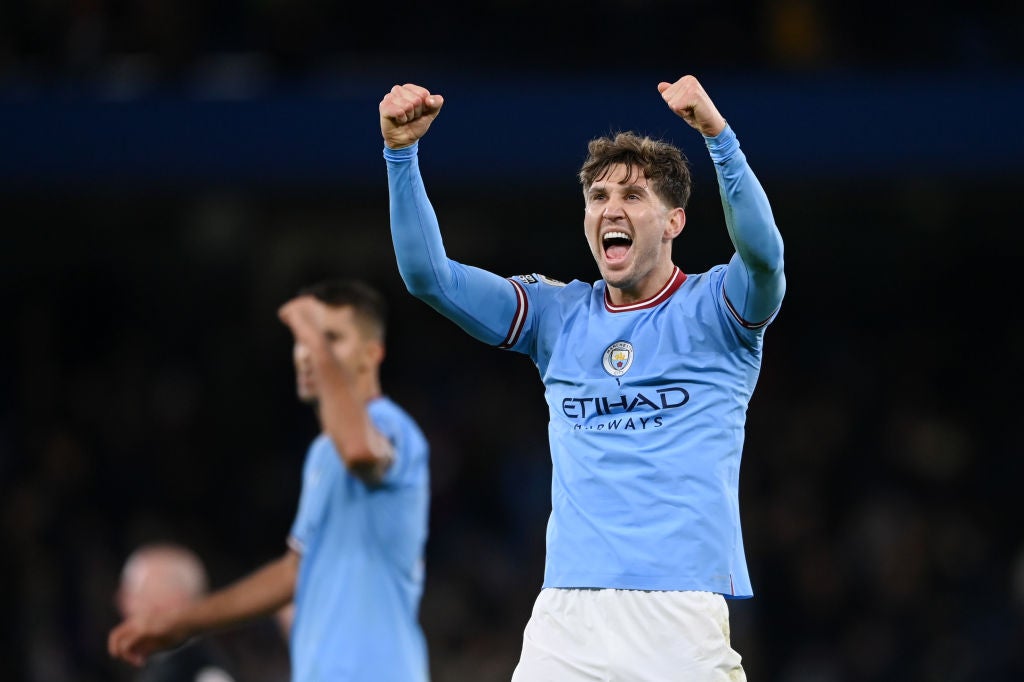
Long before the Barnsley Beckenbauer was reinvented as the Barnsley Busquets, he was the Barnsley benchwarmer. John Stones enters the Champions League final as a revelation, the man whose career has progressed in an unexpected way by moving forward: literally, given that the centre-back doubles up as a midfielder now.
Rewind three years, however, and the most stylish English central defender of his generation had adopted a different, unwanted status: of the substitute, and not even the resident super-sub. When Manchester City exited the Champions League in 2020, he had a watching brief, unused as they were beaten by Lyon. Even that was perhaps not the worst element. Even as Pep Guardiola picked an unusually defensive team against the side who finished seventh in Ligue 1, Stones was not one of his three centre-backs.
Eric Garcia was, though he was a teenage rookie. Fernandinho was, though he was a 35-year-old midfielder. Aymeric Laporte was, though he had spent much of the season injured. The backdrop may have been still more damning for Stones: Vincent Kompany had left the previous summer and, after City failed to buy Harry Maguire, the captain had not been replaced. Stones should have been the main man; instead he was the spare man, starting just 12 league games, only featuring for 16 minutes of City’s final five matches in all competitions, fifth in line, with Nicolas Otamendi probably ahead of him too.
“It was probably one of the hardest times in my career,” Stones said. “Any game that you don’t play, or feel maybe that you should be playing, every player feels like that when they don’t play, especially here because we’ve got an incredible team, it’s always difficult.”
The summer of 2020 felt a crossroads in Stones’ career. After erring by not recruiting a centre-back the previous year, Pep Guardiola bought two, in Ruben Dias and Nathan Ake. The competition for places increased. Perhaps that could have been that for Stones at City; he may have been remembered as a gifted player who fleetingly showed his potential, whose goal-line clearance against Liverpool helped decide the 2019 title race, but who was cast aside in Guardiola’s perpetual quest for improvement.
But Stones was adamant he would not be making way. “No, I never thought about that,” he said. “I think as soon as you accept that or have that mindset then you have killed yourself. So I always wanted to stay, I have stayed and I absolutely love it.
“I wanted to prove to myself, I didn’t say to anyone, ‘It was because I want to prove to you’. I think, if anything, you have to prove to yourself first and foremost that you deserve to be here, you are good enough to be here, and what you bring to the team. Everyone’s so unique here and I feel that’s why we’ve been so successful.”

For Stones, the start of his revival was to look in the mirror. “I literally went back to firstly looking at myself, being super-critical of myself and what I could do better on the football pitch, and then looking into every fine detail, down to food, what food, training, what training, what extras,” he added.
“That’s come down to doing stuff here and then going home and doing work, even late at night, or straight after the training and all these kinds of specific things, finding these small margins, put them all together to kind of break where I was at after coming back to playing. It was a big learning curve for me and maybe who I am today.”
If there were two phases to his return to prominence, the first was to feature more frequently in his preferred position. He leapfrogged Garcia and Fernandinho in the queue for places. Yet this year has brought another aspect, with an evolution that has come at Laporte’s expense. He has proved City’s renaissance man, taking his assurance in possession – he has a pass completion rate of over 90 percent in both the Premier League and the Champions League in each of his seven seasons in Manchester – to a role further up the pitch. He was long seen as a centre-back with a midfielder’s skillset. It is another thing to spend much of each match in midfield.
“People have always said from a young age that they can see me playing in there,” Stones reflected. “I did and still do love playing as a centre-half and I’ve absolutely loved this role as well. I think I have showed myself that I’m able to do it. Maybe I am showing some attributes that I didn’t know that I had, but the manager has seen in me.”
He has become the midfield metronome who still spends part of his time marking strikers. He partners both Rodri and Dias whereas three years ago, when City’s Champions League campaign concluded, he was alongside Adrian Bernabe, Tommy Doyle and Claudio Bravo among the unneeded replacements.
A transformation in his fortunes has included a makeover as a player. The journey, from bench to defence to midfield, could make the eventual achievement even better. Stones said: “If I hopefully look back after Saturday, with a winner’s medal, it will be super-sweet.”







